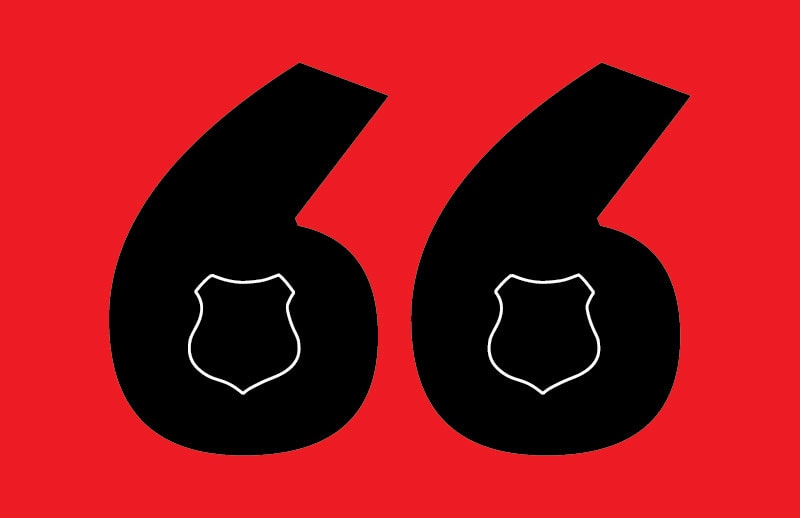To better understand the impact and lessons exchanged through these programs, we turn to program participants themselves–what they’re saying about the programs and the ways they’re implementing lessons learned. Below is a series of quotes from participants of deadly exchange programs commenting on why they go on exchange programs, the lessons learned on these programs, and how participants bring back those lessons to their work.
Why They Go:
Program participants reflect on the value of these exchange programs, the role they play–or should play–in shaping U.S. policing, as well as the bigger picture importance of U.S.-Israel police collaboration.
“Now let’s be honest… This whole idea of best practices is just a euphemism for: We’re here to steal some of your great ideas. And a lot of great ideas and technology, indeed, you do have here in Israel. I would hope that you do not view this as a negative, because in this day and age of globalization, our needs are truly similar. In fact, we are much more alike than dis-alike. As civilized nations, we are all confronted with, in many cases, the same enemy: The ever-growing threat of terrorism and other major criminal elements.”
— Horace Frank, commander of the LAPD Information Technology (IT) Bureau, 2014 (source)
“There are countries out there and religious leaders and political leaders that wake up every day trying to kill Americans and trying to kill Israelis and others to be sure, so from that standpoint you carry that passion and reality back home.”
— Sheriff Jeff Wiley, Ascension Parish, Louisiana (LEEP Participant) (source)
“While visiting an Israeli prison, I was able to visit and speak with a terrorist in prison serving a life sentence […] I specifically asked him about his thoughts about the United States and he said “You fight with Israel. Enough said.” This really brought home for me the point that the destinies of our two countries are linked and that geopolitics, not geography, is destiny.”
— David Myers, San Diego County Sheriff’s Department, 2014 (source)
“Officers who take part in visits of this sort “come back and they are Zionists. They understand Israel and its security needs in ways a lot of audiences don’t.”’
— David C. Friedman, the Anti-Defamation League’s Washington DC Regional Director and Director of National Law Enforcement Initiatives, 2015 (source)
“You’ve obviously given us a lot to think about, a lot of best practices to go back and put into place. And I promise you that we’ll incorporate some of the great things that you’ve done here in the state of Alabama.”
— Director James Walker, Department of Homeland Security, Alabama (LEEP Participant) (source)
“No experience in my life has had more of an impact on doing my job than going to Israel,”
— Washington D.C. Police Commander Cathy Lanier, 2007 (source)
Lessons Learned:
Snippets from news articles help paint a clearer picture of the program contents and the kinds of lessons, tactics and ideologies exchanged.
“The group went to Jerusalem and saw the massive video surveillance system used by local police to keep the peace. […] In Jerusalem, they have a system of 200 cameras, […] In the old part of the city, they can follow you anywhere. […] it was like Star Wars compared to what we do.”
–Maine State Police Col. Robert Williams (source)
“[Commander] Frank said he was especially impressed by what he saw while visiting Israeli companies Nice Systems (as tweeted by [LAPD Deputy Police Chief] Perez) and Verint, one of the companies whose services the National Security Administration (NSA) reportedly used in the infamous United States wiretapping scandal. Both companies already count the LAPD as a client. But, Frank said, “we’re looking at some of their additional solutions … They have a lot of new technologies that we are very much interested in.”” (source)
“This notion that you collect mass amounts of intelligence in order to sort and analyze it has been known and expected in Israel for years.[…] It wasn’t known and well-taught in the U.S. that secret services don’t operate on probable cause, so this mass collection took them by surprise. We [Israelis] tend to give more permission to counter-terror operations to use a technology that will be able to predict a potential terrorist. It’s more socially acceptable.”
— Nimrod Kozlovski, co-founder of Tel Aviv University’s cyber security program (source)
“[The Israelis] discussed how important it was to have police embedded in the community to get intelligence about a problem before it happens.”
— ADL delegation, December 2016 (source)
“They toured Tel Aviv’s Ben Gurion Airport, considered to be one of the most secure airports in the world. Unlike in the United States, where racial and ethnic profiling is forbidden, Israeli airport officials explained how they use profiling to identify suspicious passengers, questioning them extensively and performing searches if necessary. Dozens of undercover, armed security officers mill among the passengers, an airport official explained.” (source)
Taking It Home:
Participants explain the direct implementation of lessons learned from the exchange programs.
“[Baltimore County Police Captain] Zaryk said he has received valued lessons from Israeli officials this week, and during previous Israeli-led training exercises in the United States, about gathering human and electronic intelligence that he can apply to investigations into organized crime and gangs.” (source)
“We opened a video integration center here in Atlanta a few years ago, and that was a result of an operation center that we looked at in Israel. And so we have mimicked one of their operations centers […] this one happened to be in Jerusalem, that they [use to] monitor the community there.”
— Atlanta Deputy Police Chief Spillane, after returning from his trip to Israel in 2015 (source)
“The knowledge gleaned from observation and training during the LEEP trip prompted significant changes to the organizational structure of the New Jersey State Police and brought about the creation of the Homeland Security Branch. This Branch, comprising of nearly a thousand members of the State Police, now maintains a steady state of vigilance in New Jersey. It has strengthened our partnership with the New York City Police Department and permits us to deploy within our state in response to international terrorist events such as the Madrid bombing and worldwide threats by Hamas and Al Qaeda.”
— Colonel Joseph R. (Rick) Fuentes, Superintendent, New Jersey State Police, NJ (LEEP Participant)
“Ralph Morten, a Los Angeles police detective on the bomb squad and the Joint Terrorism Task Force, has conducted more than 1,000 training sessions for more than 25,000 police, fire and military personnel based on what he learned in Israel.” (source)
“Ramsey ordered his officers to keep their red and blue roof lights flashing all the time to be more visible — something he picked up when he, Gainer and Wexler went on a ride-along with the Jerusalem police two years ago.” (source)

